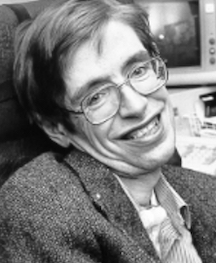On this date in 1942, cosmologist Stephen Hawking was born in Oxford, England, “300 years after the death of Galileo,” as he once noted. He attended Oxford, studying physics, then earned his Ph.D. in cosmology at Cambridge. By his 21st birthday he had been diagnosed with amyotrophic lateral sclerosis (Lou Gehrig’s disease).
Despite his disability, which confined him to a wheelchair and forced him to rely on mechanized speech, Hawking became a research fellow, worked at the Institute of Astronomy, and in 1973 joined the Department of Applied Mathematics and Theoretical Physics at Cambridge.
Hawking is celebrated for his work on unifying General Relativity with Quantum Theory. His popular science books include A Brief History of Time, Black Holes and Baby Universes and Other Essays and The Universe in a Nutshell. Although some rationalists have been disappointed in his tendency to use the term “god” too loosely as a metaphor, Hawking made it clear he did not believe in a personal god.
In an interview with Diane Sawyer on ABC News (June 7, 2010), Hawking said, “There is a fundamental difference between religion, which is based on authority, [and] science, which is based on observation and reason. Science will win because it works.”
In his follow-up book The Grand Design (2010), Hawking and co-author Caltech physicist Leonard Mlodinow wrote that “God” is not necessary: “Because there is a law such as gravity, the universe can and will create itself from nothing. Spontaneous creation is the reason there is something rather than nothing, why the universe exists, why we exist. It is not necessary to invoke God to light the blue touch paper and set the universe going.”
In an interview with the Spanish newspaper El Mundo (Nov. 6, 2015), Hawking was more forthright about declaring his atheism: “Before we understand science, it is natural to believe that God created the universe. But now science offers a more convincing explanation. What I meant by ‘we would know the mind of God’ is, we would know everything that God would know, if there were a God, which there isn’t. I’m an atheist (Soy ateo).”
In his last book, Brief Answers to the Big Questions, published posthumously in 2018, Hawking wrote, “There is no God. No one directs the universe.” Included in his parting advice: “Remember to look up at the stars and not down at your feet. Try to make sense of what you see and wonder about what makes the universe exist. Be curious. And however difficult life may seem, there is always something you can do and succeed at.”
Hawking met Jane Wilde in 1962, the year before his motor neuron diagnosis. They married in 1965 and had three children: Robert (1967), Lucy (1969) and Timothy (1979). His poor health and her strong Christian beliefs led to their divorce in 1995, after which he soon married Elaine Mason, one of his nurses.
After their divorce in 2006, Hawking resumed closer relationships with Jane and his children. Her book Travelling to Infinity: My Life with Stephen was published in 2007 and was made into a film, “The Theory of Everything,” in 2014.
Hawking died at his home in Cambridge at age 76 and his ashes were interred in Westminster Abbey’s nave between the graves of Sir Isaac Newton and Charles Darwin. (D. 2018)
PHOTO: Hawking at NASA’s StarChild Learning Center, c. 1980s


